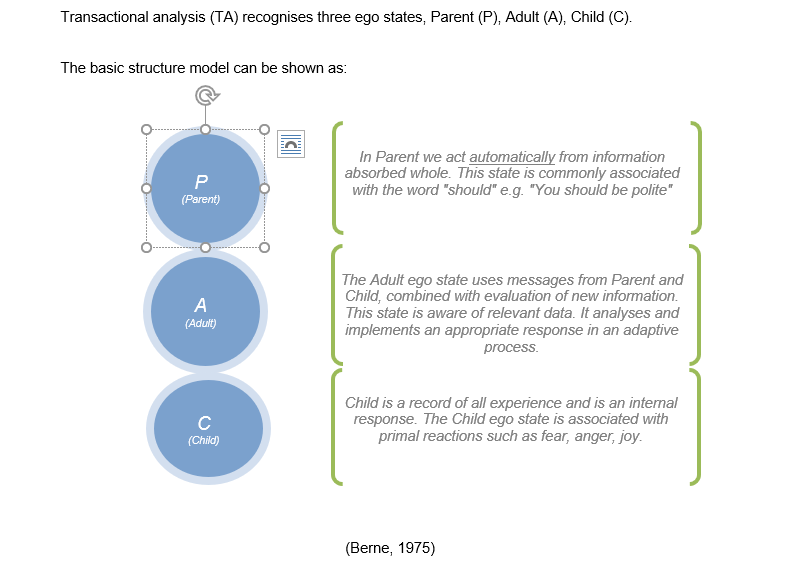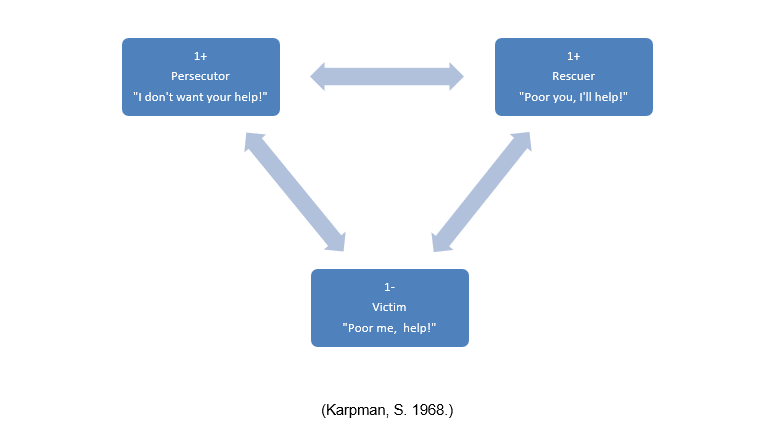Welcome to my “In a Nutshell” series. When you are looking for a therapist the terminology can be baffling. There is so much theory, so many different fields of study and dozens (literally dozens) of different therapeutic modalities. How do you know if what I offer matches what you want from therapy? This limited series of blogs will explain the three core theories I use in my practice and I will attempt to show how they may be useful for you.
The underlying principles of Transactional Analysis (TA)
I’m OK – You’re OK
“I’m OK – You’re OK” is at the heart of TA’s philosophy. It is a term used to express the belief that we are all of value. Our “OK position” influences how we view our place in the world and impacts our relationships.
Strokes
The founder of TA, Eric Berne, observed that people need “strokes” to survive. A “stroke” is a unit of interpersonal recognition. There are two types of stroke: positive and negative. Berne observed that positive strokes are preferable and encourage individuals to thrive. An example of this would be smiling at a stranger and receiving a smile back. Immediately the day feels brighter. Positive strokes encourage us, boost our self esteem and enhance our self-image. However, when positive strokes are unavailable any stroke is better than none at all. This can be exemplified by a child who acts out at school. When a child is neglected at home they will often be “naughty” because their organismic self requires some form of recognition, even if it results in being told off. A stroke can be understood as a means to satisfy our biological need for recognition and avoidance of sensory deprivation.
Ego States
Berne postulated that the human personality is made up of three “ego states”. Each ego state is an entire system of thoughts, feelings, and behaviours via which we have interactions with each other.

Transactions
A transaction is a basic communication unit between people. In everyday language we call a series of transactions between people “a conversation” (or sometimes an argument).
Life Script
Berne proposed that dysfunctional behaviour is the result of self-limiting decisions made in childhood. These decisions would have been made by the child to ensure survival in their home environment and they form a sort of life plan called the “life script”. For example, people who made the childhood decision that they are stupid (based upon what they were programmed to believe by their primary care takers) will follow a life pattern that reflects their belief. Tell a child often enough that they are naughty and eventually this will become part of their life script.
Games
Berne noticed that many people enter into repetitive dysfunctional behavioural patterns. He called the behavioural patterns “Games.” The purpose of a Game is to get the stroke we want to receive from others but can’t ask for in healthy ways. Games reinforce our negative feelings and self-concepts. Games are always played out of the awareness of the people in the game, therefore the purpose of recognising Games is not to apportion blame. What the people playing actually want is the familiar feeling of knowing “I knew it, this always happens to me!” Games follow a pattern during which the players move positions on the following chart (The Drama Triangle):

Games are recognisable, once you know what you are looking for. For example, Bob complains he is struggling to write an important presentation, Ann offers advice. Bob replies, “yes , but….” Ann offers more advice, and gets the same response several times. Bob becomes annoyed and tells Ann “You have been no help at all!” See if you can follow this set of transactions on the diagram, work out what position Bob and Ann were in when they entered the game and compare it with where they ended up.
Contracts
In a counselling practice, Transactional Analysis requires a mutual contract for a defined change. TA counsellors consider that people are capable of deciding what they want their lives to be. As a result, in my practice I help my clients to define what they want to change and how they will recognise when they have what they want. Afterall, if you don’t know where you are heading, how will you know when you get there?

Helen Clarke is a qualified Humanistic Integrative Counsellor based in Coastal West Sussex. She specialises in loss and the associated physical signs of profound, traumatic loss, such as palpitations, sleep issues, panic attacks, vivid and recurrent dreams, unexplained aches & pains, a sense of immediate and physical fear or overwhelming sadness.
Follow this link for more information on Helen’s private practice. https://safespacesussex.co.uk
Follow @sussexcounsell1 on Twitter

